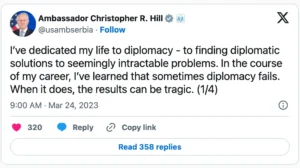In a March 2023 Tweet, Ambassador Christopher Hill’s apology regarding NATO’s bombing campaign in Serbia has raised deep concerns. This article aims to shed light on the troubling implications of his words, which not only distort historical facts but also undermine the principles of justice, human rights, and democracy that the United States claims to uphold.
Ambassador Hill’s expression of regret for NATO’s airstrikes on Serbia is deeply distressing. Seeking forgiveness is not merely an insult to the victims and survivors of the atrocities committed by the Serbian armed forces under Milosevic’s regime; it is also a slap in the face to those who fought for justice and peace in the region.
By attempting to exonerate Serbia, Hill demonstrates a complete disregard for the truth and the history of the Balkans. His apology fails to acknowledge NATO’s role in preventing genocide and ethnic cleansing in the region, portraying a misguided attempt to absolve the forces of hatred and violence in Serbia.
Furthermore, Hill’s apologetic tone only serves to fuel Serbian chauvinism and fascism. Through his words, he encourages the distortion of truth and promotes a fabricated narrative against the Albanian people and other ethnic groups who suffered from the Milosevic engine of crimes and war crimes against humanity in the region. It is unacceptable for an American ambassador to endorse such actions, constituting a betrayal of the values of justice, human rights, and democracy that the United States purports to champion.
It is crucial to emphasise that the atrocities committed by the Serbian armed forces throughout the Balkans were not isolated incidents. Violence was part of a broader campaign of ethnic cleansing and genocide orchestrated by Milosevic’s regime. The Serbian government and military targeted Albanians, Bosniaks, and Croats in a brutal campaign of violence that left thousands dead and hundreds of thousands displaced.

NATO intervention was a necessary response to this violence and ultimately helped bring an end to the conflict in Kosovo. However, it is important to acknowledge that the bombing campaign had unintended consequences, including the displacement of some Serbian civilians and damage to infrastructure across Serbia. Yet, these were the consequences of Serbia’s own criminal actions over a decade.
Despite these unintended consequences, NATO’s bombing campaign was a necessary intervention that ultimately saved countless lives and put an end to the violence in Kosovo. Hill’s call for an apology fails to recognise this fact and is a betrayal of the values that the United States claims to uphold.
Furthermore, Hill’s rehabilitative apology for Milosevic’s brutal regime is particularly concerning given the current political climate in Serbia. The country’s leader, Aleksandar Vucic, is a former information minister of Milosevic’s regime and continues to propagate fascist rhetoric, serving as a base for Russia’s imperialist ambitions in the Balkans. The Belgrade government has refused to recognise Kosovo’s independence and consistently seeks to sabotage and obstruct international efforts to establish peace in the region.
The situation in the Balkans remains unstable, with Serbia aligning itself with Russia’s aggressive foreign policy and stoking ethnic tensions throughout the region. The United States and the European Union must stand firm against Serbian aggression and work towards peace and justice for all people in the Balkans.
Ambassador Christopher Hill’s apology for NATO’s bombing campaign in Serbia is deeply concerning. It constitutes a betrayal of the values of justice, human rights, and democracy that the United States claims to uphold.
Moreover, with this act, Ambassador Hill is aiding and abetting Serbian chauvinism and fascism, promoting the distortion of truth and a fabricated narrative against the Albanian people and other ethnic groups in the region.
It is essential to revisit this issue in English as Ambassador Hill continues to rehabilitate Serbian chauvinist figures, including those designated as ineligible to travel to the United States.
Published in KOHA Ditore, March 2023

